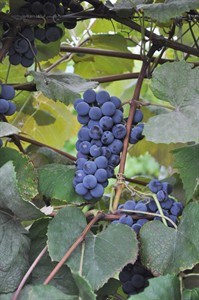
This Sept. 9, 2010 photo shows Concord grapes which are a resilient grape with a bold flavor, in Geneva, N.Y. (AP Photo/Lee Reich)
September 30, 2014 - 6:43 AM
The edges of woods in eastern North America are occasionally redolent with a sweet aroma reminiscent of jasmine. Wild grapes, dangling in ripe clusters from low-hanging vines, are what perfume the air.
That scent begs a taste — which you quickly discover pales by comparison with the perfume. Wild grapes are downright sour.
Now go to your grocer's shelf and take a deep whiff of the grapes there. Hardly a hint of aroma, unless the grapes happen to be Concord, a commercial variety that captures the essence of our wild grapes. And Concord's berries are much larger and sweeter that their wild counterparts.
FOXY GRAPES
Concord is not the only grape variety that captures that unique aroma — known as "foxiness" — of wild grapes. But it is the most common one. With its tough skin that slips off to release a layer of sweetness, its jellied flesh and its foxy flavour, Concord is the archetypal American grape. Contrast it with Thompson Seedless, whose mild flavour, sweetness, and crunchy flesh are characteristic of European, or vinifera, grapes.
No one is quite sure how the strong flavour of grapes like Concord came to be called "foxy." The term probably signified a certain earthy aroma, or it might be that fox grapes were called that because foxes enjoyed them.
The chemical responsible for the aroma — methyl anthranilate — is also found in such fragrant flowers as black locust, tuberose, orange and, yes, jasmine. Commercially, it has been used as a natural bird repellent. And yes, the birds are leaving my Concord grapes alone.
MR. BULL'S SUCCESS
The man we have to thank for Concord grapes is Ephraim Bull, a retiring soul who resided in Concord, Massachusetts, from his birth in 1805 until his death in 1895. He planted the seed that was to become Concord in 1843; the vine bore its first fruits in 1849. That fruit was exhibited before the Massachusetts Horticultural Society in 1852, was introduced by a nursery in 1854 and the rest is, as they say, history.
By 1865, Concord was awarded a prize by the American Institute of the City of New York as the best grape for general cultivation. Horace Greeley, donor of the prize, declared Concord "the grape for the millions."
And planted by the millions it was. Among Concord's qualities is its adaptability to varying soils and climates. You'll find its vines growing in almost every state, even California, where European grapes thrive. For that matter, you'll even find Concord planted in Europe, as a backyard variety.
And while we may pooh-pooh those sweet wines made from Concord, they are popular in Italy even though, or perhaps because, it can be illegal there to sell Fragolino, as wines made from American-type grapes are called. (The legality is questionable and depends on just how the bottle is labeled.)
EASIER TO GROW
Concord and some other American grapes got a foothold in Europe after diseases and insects almost wiped out the European grape industry. These pests actually came from here, hitch-hiking over on American grapes that were being tried out in Europe beginning about the middle of the 19th century.
This highlights another quality of Concord: its relative resistance to insect and disease pests. Add to this list of qualities its relatively late blossoms, rarely nipped by late spring frosts; the fruit's ability to hang well, and the rich, deep colour the berries develop.
It's true some people just don't like that foxy flavour. But for an adaptable, flavourful and useful grape, plant Concord. Eat the fruit fresh, squeeze it into juice, ferment it into wine. Let the ripening berries perfume the air in your backyard. You will have no trouble finding a place to buy a Concord vine, for it's still one of the most widely sold grape varieties.
News from © The Associated Press, 2014